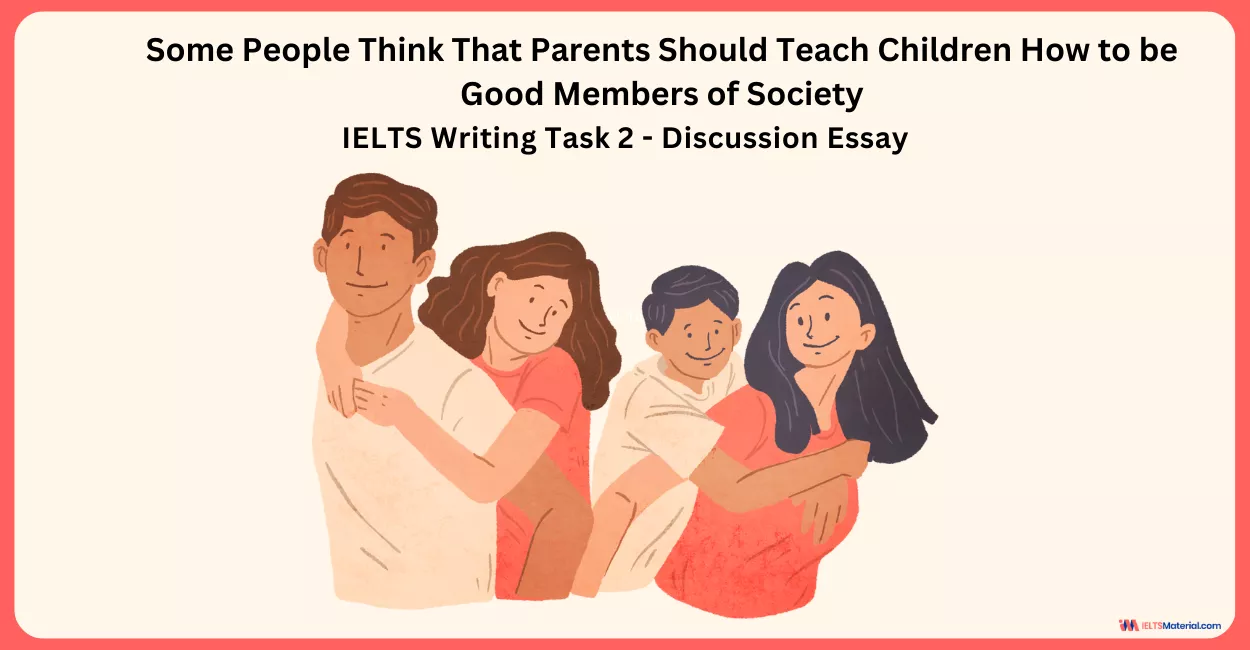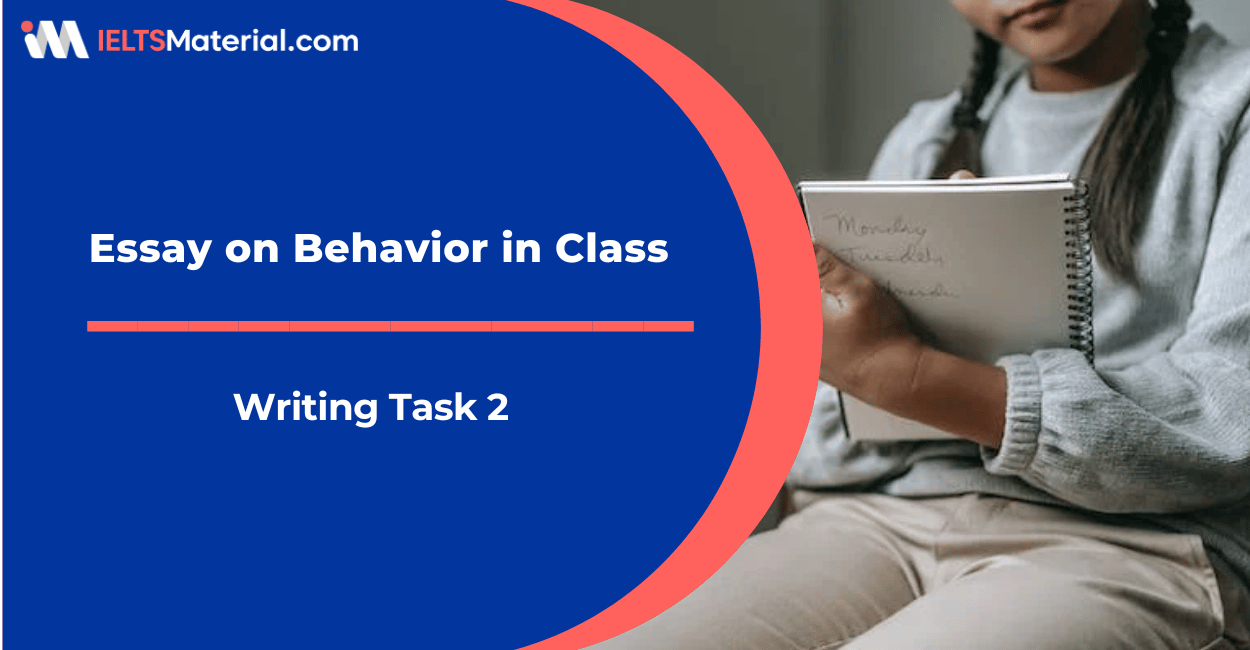Essay on Behavior in Class for IELTS – Writing Task 2
Table of Contents

Try AI Essay Checker for Instant Band Score
IELTS is one of the English language evaluation exams that millions of candidates take in order to migrate to an English-speaking country. This reflects the importance of the language on a global scale. As a result, the problem/cause and solution essay, a part of Writing Task 2 of the IELTS, is discussed here with an outline and vocabulary that will help you to prepare.
Learn some ways to achieve a band score of 8 for Writing Task 2 and check out this speaking skills essay for IELTS given below.
Question
You should spend not more than 40 minutes on this task.
You should write at least 250 words.
In many countries, schools have severe problems with student behavior. What do you think are the causes of this? What solutions can you suggest?
Outline
Essay Type
Problem/Cause & Solution Essay
Introduction
- In many countries, the manner in which students conduct themselves in schools is quite distressing.
- There are numerous reasons behind this development that have led to such alarming behavior in young children, especially adolescents.
- In the following paragraphs, I will elaborate on the causes and possible solutions to tackle this issue.
Body
Paragraph 1: Reasons/Causes of severe issues with student behavior.
Paragraph 2: Solutions to reduce this behavior.
Conclusion
Clearly restate the points covered in the essay.
Need expert guidance for IELTS? Sign up!
Sample Answer 1
In many countries, the manner in which students conduct themselves in school is quite distressing. There are numerous reasons behind this development that have led to such alarming behavior in young children, especially adolescents. In the following paragraphs, I will elaborate on the causes and possible solutions to tackle this issue.
To begin with, children lack proper awareness of the diversions around them due to a lack of adult supervision. For example, since most parents are working professionals who do not have the time to educate their children on the good and bad, these young people crave attention and easily go astray. Additionally, unbridled access to social media and video games exposes them to violent activities that are imitated by them to stand out among their mates. Further, excessive pressure created due to academic competition and societal comparisons forces some students to act out. For instance, students either go into depression due to demotivation or become vicious towards classmates who are better than them. Therefore, these factors, coupled with unhealthy lifestyles and peer pressure, tend to make students unruly, which is reflected in their etiquette at school.
There are several measures that can be taken by the elders to manage the misconduct of students at school and at home. Firstly, parents, irrespective of their busy schedules, should take time to look after their wards. For instance, spouses should divide their chores among themselves and interact with the children before bedtime, and occasionally, make them feel special through various activities. Secondly, involving grandparents in the upbringing of the child can give both company and help them to learn from each other. Thirdly, teachers should be careful not to compare the students, as each child has unique capabilities and may not achieve the same thing. Lastly, both family members and teachers should control access to the internet or cruel games that might affect the child’s psyche.
To sum up, guardians or parents should motivate the students for their efforts and take care of their surroundings so that external influences or bad lifestyle do not affect their demeanor and make them ill-tempered.
Looking for a detailed guide on IELTS Writing Task 2? Check here!
Important Vocabulary Used in the Essay on Behavior in Class
- Distressing (adjective)
Meaning: upsetting or worrying
Eg: The workload was quite distressing for me today.
- Alarming (adjective)
Meaning: causing worry or fear
Eg: The way the sea levels are increasing is alarming for us.
- Adolescent (noun)
Meaning: a young person who is developing into an adult
Eg: Parents should guide adolescents properly.
- Crave (verb)
Meaning: to have a very strong feeling of wanting something
Eg: The baby craves for the mother’s touch.
- Astray (adverb)
Meaning: away from the correct path or way of doing something
Eg: The stranger led us astray from the main road.
- Unbridled (adjective)
Meaning: not controlled or limited
Eg: The young boy became arrogant due to the unbridled attention he received from his parents.
- Unruly (adjective)
Meaning: difficult to control or manage
Eg: His unruly behavior at the party caught everyone’s attention.
- Etiquette (noun)
Meaning: the set of rules or customs that control accepted behavior in particular social groups or social situations
Eg: Please maintain the table etiquette properly.
- Psyche (noun)
Meaning: the mind, or the deepest thoughts, feelings, or beliefs of a person or group
Eg: Freudian study deals with the human psyche.
- Demeanor (noun)
Meaning: a way of looking and behaving
Eg: Her calm demeanor attracts everyone.
Sample Answer 2
In numerous nations, the behavior of students within educational institutions is a cause for concern. Multiple factors have contributed to the emergence of disorderly behavior among young individuals, particularly adolescents. In the subsequent sections, I will delve into the underlying reasons and potential remedies to address this matter.
One significant cause of behavioral issues in schools is the breakdown of the traditional family structure. With more families facing single-parent households or both parents working long hours, children may lack the necessary guidance and supervision. This can result in a lack of discipline and a decline in values taught within the home. Furthermore, economic challenges can lead to financial stress, which often trickles down to affect a child’s emotional well-being. Moreover, the influence of media and technology cannot be underestimated. The constant exposure to violent or inappropriate content desensitizes students to aggressive behavior, making them more prone to acting out inappropriately. Additionally, social media platforms can exacerbate conflicts among students, leading to disruptions within the school setting.
To address these issues, schools should prioritize fostering a strong sense of community. Implementing mentorship programs and involving parents in their child’s education can create a support system that reinforces positive behavior. Schools can also provide workshops and resources to help parents develop effective discipline strategies at home. Furthermore, it is imperative to incorporate media literacy into the curriculum. In addition, schools should promote extracurricular activities that encourage teamwork, leadership, and conflict resolution skills. These activities not only provide an outlet for pent-up energy but also instill values that promote positive behavior.
In conclusion, the severe problems with student behavior in schools stem from a combination of factors. However, by facilitating a sense of community, teaching media literacy, and providing opportunities for positive engagement, schools can work towards creating a more conducive learning environment for all students.
Important Vocabulary Used in the Essay on Behavior in Class
- Disorderly (Adjective)
Meaning: It describes something that is chaotic, messy, or not well-organized.
Eg: The disorderly classroom made it challenging for the teacher to conduct the lesson effectively.
- Trickles Down (Verb phrase)
Meaning: It refers to a process in which something, often wealth or information, gradually passes or spreads from a higher level to a lower level.
Eg: In some economic systems, the idea is that when wealth trickles down from the rich to the poor, it benefits everyone in society.
- Desensitizes (verb)
Meaning: To make less sensitive or responsive to something.
Eg: The continuous exposure to violent movies desensitizes children to real-life aggression.
- Exacerbate (verb)
Meaning: To make a problem, bad situation, or negative feeling worse.
Eg: Adding fuel to the fire will only exacerbate the conflicts among students.
- Fostering (Noun)
Meaning: It refers to the act of nurturing, promoting, or encouraging the growth or development of something.
Eg: The fostering of creativity in schools is essential for students’ overall development.
- Mentorship (Noun)
Meaning: The guidance and support provided by a mentor, usually a more experienced or knowledgeable person.
Eg: The mentorship program pairs experienced teachers with new educators to offer guidance and support.
- Imperative (Adjective)
Meaning: It signifies something that is crucial, necessary, or of utmost importance.
Eg: It is imperative that we address the environmental challenges facing our planet to ensure a sustainable future.
- Pent-Up (Adjective)
Meaning: It describes emotions or energy that has been suppressed, restrained, or held back for a period.
Eg: After a long day of work, she had a pent-up desire to relax and unwind by taking a long walk in the park.
- Conducive (adjective)
Meaning: Making a certain situation or outcome likely or possible.
Eg: A peaceful and inclusive classroom environment is conducive to effective learning.
Also, check:
- Academic IELTS Writing Task 2 Topic (In September 2015) & Band 9.0 Essay
- Academic IELTS Writing Task 2 Topic ( In January 2016) & Band 9 Model Essay.
- Academic IELTS Writing Task 2 Topic (In July 2015) & Band 9.0 Argumentative Essay
- Academic IELTS Writing Task 2 Topic: Architecture & History – Sample Essay
- Academic IELTS Writing Task 2 Topic: Environment & Sample Essay
- Academic IELTS Writing Task 2 Topic: Economic Growth With Model Essay
Practice IELTS Writing Task 2 based on Essay types

Start Preparing for IELTS: Get Your 10-Day Study Plan Today!
Recent Articles

Haniya Yashfeen


Prity Mallick

Kasturika Samanta




Post your Comments